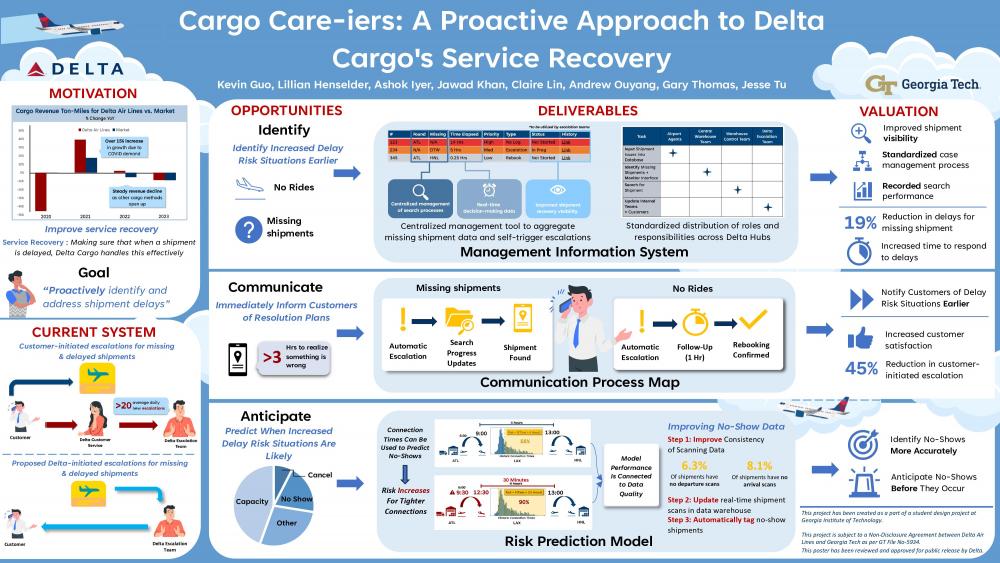Client Context
Delta Cargo uses unused space on passenger planes to transport shipments daily. Air cargo industry shipping volume declined in 2023 because cheaper ground and sea alternatives resurged after limited service during the COVID-19 pandemic. Delta saw a 32% ($180 million) decline in revenues in the first half of 2023 compared to the first half of 2022. As a result, Delta is focused on retaining their current customers and differentiating themselves from their competitors.
Service recovery (issue resolution) is one differentiator because on-time reliability is a key reason why customers opt for air cargo. Customers need to be notified promptly about delays so they can plan accordingly.
Delta Cargo’s Customer Satisfaction (CSAT) scores from Q2 2023 show that over 80% of customers view service recovery as an area for improvement. Additionally, a representative group of Delta Cargo’s top customers advised that Delta Cargo improve service recovery by becoming more proactive in addressing potential shipment delays.
Project Objective
Identify: Proactively identifying potential delays will allow Delta to create resolution plans earlier that reduce the extent of these delays.
Communicate: In turn, Delta can communicate these plans earlier with customers, reducing their need to escalate and increasing their trust in Delta to handle issues internally. This will allow Delta to increase customer satisfaction and retain customers.
Anticipate: Delta can enhance these benefits by predicting potential delays before they occur.
Design Strategy
Identify
Two common situations that significantly increase the likelihood of delay are no-rides (shipments do not get on an initially assigned flight) and missing shipments. Delta Cargo’s rebooking team has centralized no-ride data, allowing them to rebook shipments quickly. However, their escalation team, responsible for recovering shipments when they go missing, often does not start searching for shipments until customers notify them. The first deliverable, a management information system design, addresses this by centralizing information on missing shipments for the escalation team.
Two areas detract from cross-functional team communication and search process time:
- Delta airport agents currently report 50% of missing shipments. The escalation team is not immediately notified when missing shipments are internally identified; there is a lag in internal communication. The remaining missing shipments are identified after customer escalation.
- Interviews highlighted communication difficulty among the escalation team, customers, and airport agents.
- Multiple teams monitor the same email inbox for missing shipment information but do not communicate with each other on which shipments have been searched for.
- Customers escalate to local airport warehouse teams about shipment concerns without alerting the escalation team.
- Airport agents and local airport warehouse teams do not always update the shipment booking software with resolution progress.
To help Delta proactively identify missing shipments, the solution design satisfies three steps:
- Increase internal awareness of missing shipments
- Relay information about missing shipments to the escalation team for resolution and customer notification
- Reduce redundancy in information transmission process with regards to missing shipments
Communicate
Currently, after a customer contacts Delta about their shipment, an escalation agent opens an escalation using a Salesforce-backed tool. The escalation automatically triggers an email to the customer. The Salesforce tool then automatically sends customers a notification once per day to update them on resolution progress. However, it usually takes 3+ hours after a shipment no-rides or goes missing for customers to escalate, and until customers escalate, they do not receive resolution updates. By internally escalating shipments, Delta can reduce this lag.
The rebooking team already has real-time centralized data on shipments that no-ride, and once the system improvements discussed in the Identify section are implemented, the escalation team will also have centralized data on which shipments are missing. Updating Salesforce to automatically escalate shipments requires the centralized missing shipment and no-ride data to be imported into Delta Cargo’s Enterprise Data Warehouse. Subsequently, the data should be linked to the Salesforce tool.
Following implementation, customers will be notified immediately when a shipment no-rides or goes missing and once the escalation is resolved, with recurring notifications in between.
Anticipate
Delta can enhance these customer benefits by predicting potential delays before they occur. The last deliverable, a risk prediction model, uses the historical distribution of connection times at various airports to identify shipments at a high risk of “no-show” (one category of no-rides) so they can be rebooked early. The model calculates the no-show risk of a shipment by using historical connection times as a basis, since historical connection times to represent how long a shipment usually takes to make a connection. For a shipment in transit, no-show risk is defined as the proportion of historical connection times at a given airport that exceed the connection time available for the current shipment at this airport. If the risk is above a predefined threshold, the model flags the shipment for the rebooking team to reassign to a new flight.
However, the model's performance is currently limited by data quality issues. Shipments with a negative connection time (arrival of one flight occurs after the departure of the next) should always be tagged as no-shows because these connections are impossible. However, currently 80% of shipments with negative connection time are not tagged as no-shows. This can be attributed to the scanning data used to generate connection times or the method in which no-shows are tagged. Our team has devised a data improvement strategy to address these issues, enabling Delta to assess the model’s performance more accurately (discussed further in the deliverables section).
Deliverables
Management Information Tool Design
The design for the management information tool consolidates key information about missing shipments into one aggregate view for teams involved in searches. The goal of the tool is to expedite the missing shipment identification and resolution process by presenting real-time data.
Updated Team Responsibility Matrix
The RACI matrix streamlines the responsibilities of teams involved in searches. This ensures each team is responsible for only one portion of the process.
Customer Notification Enhancement Proposal
This technical report will detail the communication schema that Delta Cargo should adopt when implementing an automated Customer Notification system to proactively communicate information.
Risk Prediction Model Python Script
This script generates distributions of historical connection times by airport. It contains a function that calculates the risks of shipments and a function that flags shipments with a risk level that exceeds a predefined threshold. It will be useful once Delta has worked through the Data Quality Improvement Strategy.
Data Quality Improvement Strategy
- Improve Consistency and Accuracy of Scans with RFID: Currently, 6.3% of shipments have no departure scans and 8.1% of shipments have no arrival scans. By investing in Radio-Frequency Identification (RFID) scanners at airports, Delta Cargo will reduce the rate of missing scans. RFID implementation details at individual airports are outside the scope of this project.
- Send Scans in Real-Time to Enterprise Data Warehouse (EDW): With complete and accurate scans, the next step is sending these scans in real-time to Delta’s EDW as opposed to the end of each day, which is the current frequency. This allows the scans to be immediately compared with originally assigned flights for each shipment.
- Automatically Tag Shipments as No-Shows Based on Scans: The final step is checking the scans immediately after a shipment’s originally assigned flight departs. If the originally assigned flight does not appear in the scans at this point, then the shipment will automatically be marked as a no-show for that flight.
Value and Impact
Identify: The escalation team estimates the management information system will provide over 7,000 more hours of search time annually and the updated role responsibilities will reduce task redundancy by 55% after implementation.
Communicate: Following implementation, the customer notification system is anticipated to reduce customer-initiated escalations by approximately 55% and save over 4,800 labor hours annually for the escalation team. A decrease in customers' need to escalate enhances trust in Delta's internal resolution processes, thereby increasing customer satisfaction and retention.
Anticipate: Following implementation, the data improvement strategy is expected to reduce the time spent searching for shipments and increase the percentage of successful searches by 50%, resulting in annual savings of over $800,000 in customer reimbursements for Delta.
With the updated no-show data, Delta can assess the risk model’s performance more accurately. If the model accurately flags no-shows before they occur, Delta can rebook the flagged shipments and notify customers earlier. This increases the rebooking team’s ability to reduce the extent of delay, and from the customer perspective, enhances the benefits from the communicate section. This customer benefit depends on how early shipments are flagged, which is determined by the threshold Delta decides to use. Because Delta will not know the threshold until the data quality issues are resolved, this benefit is difficult to quantify right now.


